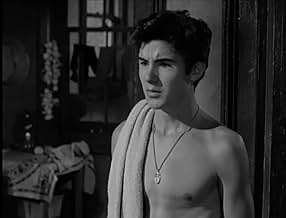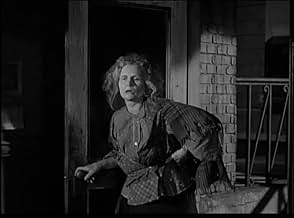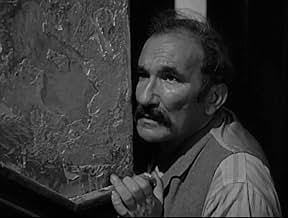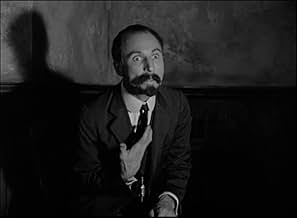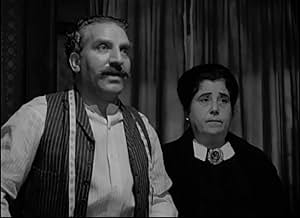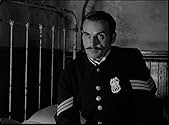Back in NYC from Italy, Johnny Columbo seeks revenge on his father's killers, the Black Hand. Love and friendship with a police officer make him consider lawful alternatives to vengeance.Back in NYC from Italy, Johnny Columbo seeks revenge on his father's killers, the Black Hand. Love and friendship with a police officer make him consider lawful alternatives to vengeance.Back in NYC from Italy, Johnny Columbo seeks revenge on his father's killers, the Black Hand. Love and friendship with a police officer make him consider lawful alternatives to vengeance.
Eleonora von Mendelssohn
- Maria Columbo
- (as Eleonora Mendelssohn)
- Director
- Writers
- All cast & crew
- Production, box office & more at IMDbPro
Featured reviews
When I think of Gene Kelly, I think of "Singing in the Rain" or "An American in Paris," as I imagine most would. I would never expect to see him playing an Italian who comes back from the old country to avenge the death of his father. Casting him as an Italian was way off base. They couldn't find an Italian to play an Italian? This miscasting affects the whole movie.
You should not look for something that resembles "The Godfather" here as there is a similar revenge story. This was done in 1950 and people were obviously more gullible. Imagine that he was able to pick up a lit cigarette with his feet and use it to light a fuse. Imagine that he could do that, without even imagining the fact that he did it in a room full of people. Incredible! The one redeeming part of the movie was the part played by J. Carrol Naish, as a police detective who figures out a way to beat the mob.
Of interest as the predecessor to the films that we all love today about the Mafia.
You should not look for something that resembles "The Godfather" here as there is a similar revenge story. This was done in 1950 and people were obviously more gullible. Imagine that he was able to pick up a lit cigarette with his feet and use it to light a fuse. Imagine that he could do that, without even imagining the fact that he did it in a room full of people. Incredible! The one redeeming part of the movie was the part played by J. Carrol Naish, as a police detective who figures out a way to beat the mob.
Of interest as the predecessor to the films that we all love today about the Mafia.
Black Hand (1950)
Sandwiched between his many superb musicals, this straight up drama has Gene Kelly playing an Italian returning home to find out who murdered his father years before. It's very well made—crisp writing and editing, excellent acting, and a kind of mise-en-scene that seems about right for bustling New York.
The pressure Italian mobsters press onto their own neighborhood Italian store owners and merchants is terrible and maddening, of course, and here we are made to feel it as directly as a movie can manage. Besides Kelly, two other actors are just superlative—J. Carol Naish, playing the police detective who eventually goes to Italy to find evidence, and the store owner (whose name I can't find in a hurry). Oddly, both Naish and Kelly are Irish-Americans playing Italians in early 20th Century New York.
The plot is a bit forced, as this kind of large social-issue movie usually ends up doing. The mob (known as the Black Hand) is making life miserable for average folk, and whenever one resists, they end up dying or almost. But somebody has to do something about this, so between the cops (some Italian, some not) and the heroics of one individual (played by Kelly), the thugs are brought down one little notch.
But if you go along with inevitable victory of the little guy over the forces of evil, you'll see a really finely made drama with terrific acting (Kelly is no slouch and Naish is brilliant) and excellent filming (almost inevitable in lat 1940s American cinema). There are lots of other characters, a few chilling scenes, some dreamy idealism, and in all a look at the times with only a slight filter over the harsher reality that is, always, the truth.
Sandwiched between his many superb musicals, this straight up drama has Gene Kelly playing an Italian returning home to find out who murdered his father years before. It's very well made—crisp writing and editing, excellent acting, and a kind of mise-en-scene that seems about right for bustling New York.
The pressure Italian mobsters press onto their own neighborhood Italian store owners and merchants is terrible and maddening, of course, and here we are made to feel it as directly as a movie can manage. Besides Kelly, two other actors are just superlative—J. Carol Naish, playing the police detective who eventually goes to Italy to find evidence, and the store owner (whose name I can't find in a hurry). Oddly, both Naish and Kelly are Irish-Americans playing Italians in early 20th Century New York.
The plot is a bit forced, as this kind of large social-issue movie usually ends up doing. The mob (known as the Black Hand) is making life miserable for average folk, and whenever one resists, they end up dying or almost. But somebody has to do something about this, so between the cops (some Italian, some not) and the heroics of one individual (played by Kelly), the thugs are brought down one little notch.
But if you go along with inevitable victory of the little guy over the forces of evil, you'll see a really finely made drama with terrific acting (Kelly is no slouch and Naish is brilliant) and excellent filming (almost inevitable in lat 1940s American cinema). There are lots of other characters, a few chilling scenes, some dreamy idealism, and in all a look at the times with only a slight filter over the harsher reality that is, always, the truth.
Remarkable only for the presence of Gene Kelly, this decidedly no-dancing 1949 drama purports to tell how a New York Mafia protection racket was smashed in the early 1900s. Kelly appears to have made it in between On the Town and Summer Stock, and possibly welcomed the chance to do some serious acting, though this never was his forte, and there are moments when you half expect him to start hoofing and warbling!
Kelly plays the part of a young man whose Italian father has been killed by the Black Hand gang years before, and is seeking revenge, initially by direct action with a knife, but later by legal means, though at the end of the day he has to use the knife any way. The film as a whole is variable, with some plausible dramatic scenes, but with others straight out of a Keystone Kops comedy, including some set in Naples. J Carrol Naish has a major role as an Italian-American detective, and a little romantic interest for Kelly is provided by Teresa Celli.
Kelly plays the part of a young man whose Italian father has been killed by the Black Hand gang years before, and is seeking revenge, initially by direct action with a knife, but later by legal means, though at the end of the day he has to use the knife any way. The film as a whole is variable, with some plausible dramatic scenes, but with others straight out of a Keystone Kops comedy, including some set in Naples. J Carrol Naish has a major role as an Italian-American detective, and a little romantic interest for Kelly is provided by Teresa Celli.
Although basically an Irishman with Irish parents, Gene Kelly succeeds very well in making a convincing Italian character. It is a great story in which Kelly gets plenty of opportunities to excel in his acrobatics (bur no dancing here!) as he generally insisted on doing his own stunts. Little Italy in New York, in which more Italians lived than in Rome around 1900, is very well recreated with excellent cinematography and photography and comes alive, in all its primitive conditions and circumstances but with the mob no less vicious and insidious than in later Godfather days; and the thriller created is as good a match as any to later New York gangster films. Teresa Celli is even more convincing as the Italian lady of the film, and all other characters are also absolutely right, especially J. Carrol Laish as the intrepid policeman ending up a martyr for not being too careful. The music by Alberto Colombo is also perfect, but I think the prize goes to Paul Vogel for the almost expressive photography.
With its scenes of extortion and murder in the Italian-American community of Manhattan's Lower East Side at the turn of the century, The Black Hand inevitably calls to mind the flashbacks to young Vito Corleone's start in The Godfather, Part II. And while it's far from that league, there's much in The Black Hand to admire.
Eight years after the murder of his father, an Italian immigrant, for daring to oppose the criminal organization called The Black Hand (the script also calls it The Mafia and The Comorra), young Gene Kelly returns to New York to pursue his vendetta. With the help of police detective J. Carrol Naish, he tries to organize the tenement neighborhood to resist the reign of intimidation and terror. But the mob has moles who anticipate and thwart his every move. When Naish travels to Naples on the case, he's killed, but not before mailing an envelope of incriminating photos to Kelly. But the little brother of Kelly's girlfriend (Teresa Celli) is kidnapped, with the envelope serving as ransom....
Among the movie's admirable points are the thoughtful, rather restrained script and foreboding nightscapes, both in New York and Naples, which lend the film a noirish tinge (as do a couple of adroitly staged moments of suspense). But the story occasionally rambles off into rhetoric about the exploitation of the immigrant underclass by politicians and police valid points, but not presented dramatically. Another dramaturgical shortcoming is that the many characters haven't been sufficiently individuated, leaving a generic ethnic muddle. The romantic angle is oddly subdued, too. The Black Hand shows signs of an interesting and ambitious production that nonetheless falls somewhat short of what it might have been.
Eight years after the murder of his father, an Italian immigrant, for daring to oppose the criminal organization called The Black Hand (the script also calls it The Mafia and The Comorra), young Gene Kelly returns to New York to pursue his vendetta. With the help of police detective J. Carrol Naish, he tries to organize the tenement neighborhood to resist the reign of intimidation and terror. But the mob has moles who anticipate and thwart his every move. When Naish travels to Naples on the case, he's killed, but not before mailing an envelope of incriminating photos to Kelly. But the little brother of Kelly's girlfriend (Teresa Celli) is kidnapped, with the envelope serving as ransom....
Among the movie's admirable points are the thoughtful, rather restrained script and foreboding nightscapes, both in New York and Naples, which lend the film a noirish tinge (as do a couple of adroitly staged moments of suspense). But the story occasionally rambles off into rhetoric about the exploitation of the immigrant underclass by politicians and police valid points, but not presented dramatically. Another dramaturgical shortcoming is that the many characters haven't been sufficiently individuated, leaving a generic ethnic muddle. The romantic angle is oddly subdued, too. The Black Hand shows signs of an interesting and ambitious production that nonetheless falls somewhat short of what it might have been.
Did you know
- TriviaThis was originally set up as a Robert Taylor vehicle.
- Alternate versionsoriginal story about Lt. Petrosino,real NYC police officer, remade as Pay or Die with Ernest Borgnine
- How long is Black Hand?Powered by Alexa
Details
- Release date
- Country of origin
- Languages
- Also known as
- La Mano Negra
- Filming locations
- Production company
- See more company credits at IMDbPro
- Runtime
- 1h 32m(92 min)
- Color
- Aspect ratio
- 1.37 : 1
Contribute to this page
Suggest an edit or add missing content

